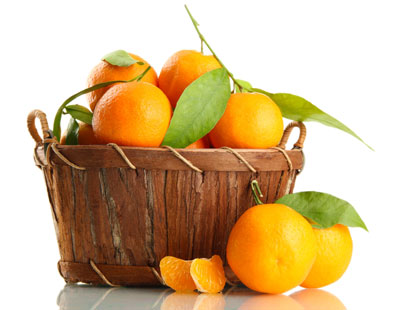





1. Tangerine Facts
2. Types of Tangerines
3. Nutritional Value of Tangerine
4. Health Benefits of Tangerine
Tangerine, (Citrus reticulata), small thin-skinned variety of orange belonging to the mandarin orange species of the family Rutaceae.
A tangerine is a small, easy-to-peel citrus fruit with a sweet and tangy flavour that is a variety of mandarin orange. It has a bright orange to reddish-orange colour, a pebbly and loose-fitting skin. The fruit can be eaten fresh, used in cooking, or juiced, and is also known for its zesty and uplifting scent, which is used in perfumes and aromatherapy.
History and Origin
Tangerines originated in Southeast Asia and were cultivated there for thousands of years before being shipped from the Moroccan port of Tangier in the 19th century, which gave them their name. Tangerines having originated in Southeast Asia, have a long history of cultivation in China and Japan.
- • Imperial
- • Afourer
- • Honey Murcott
- • Daisy
- • Hickson
- • Clementine
Common tangerine (mandarin) varieties grown and sold in Australia include Imperial, Afourer, Honey Murcott, Daisy, and Hickson. The Imperial is Australia's most popular variety, known for being easy to peel and sweet. Other popular types include the juicy, sweet but seedy Honey Murcott and the later-season, easy-to-peel, and usually seedless Afourer.
Popular tangerine varieties in Australia
Imperial: Australia's most popular commercial variety, it is sweet, has a thin, easy-to-peel skin, and has fewer seeds. It is often the first variety available at the start of the season.
Afourer: This variety is deep orange-red, easy to peel, and has a high juice content. It is typically seedless, though this can depend on growing conditions. It is a later-season fruit.
Honey Murcott: A very sweet, late-maturing fruit with a distinctive honey flavour. It is juicy and has a high sugar content, but it is more difficult to peel and contains many seeds.
Daisy: A medium-to-large mandarin with an easy-to-peel, glossy orange-red rind. It has more seeds than an Imperial but fewer than other varieties.
Hickson: This variety is known for being slightly larger, having a "neck," and a yellowish-orange, glossy rind. It is juicy and has seeds. It is an Australian-origin variety.
Clementine: While not as commercially dominant as the Imperial, Clementines (such as the Nules variety) are also grown in Australia and are popular for their sweet flavor and seedless nature.
Fruit ” Tangerine ” ( Nutritional value )
Nutritional value per 100 g
Tangerines, (mandarin oranges), raw
|
Nutrient ( Proximate’s )
|
Unit
|
Value
|
Daily Value %
|
|
Energy
|
kcal
|
53
|
2.6%
|
|
Protein
|
g
|
0.81
|
1.6%
|
|
Total lipid (fat)
|
g
|
0.31
|
0.3%
|
|
Carbohydrate, by difference
|
g
|
13.34
|
4.8%
|
|
Fiber, total dietary
|
g
|
1.8
|
7.2%
|
|
Sugars, total
|
g
|
10.58
|
|
|
Minerals
|
|||
|
Calcium, Ca
|
mg
|
37
|
2.8%
|
|
Iron, Fe
|
mg
|
0.15
|
0.8%
|
|
Magnesium, Mg
|
mg
|
12
|
2.8%
|
|
Phosphorus, P
|
mg
|
20
|
1.6%
|
|
Potassium, K
|
mg
|
166
|
3.5%
|
|
Sodium, Na
|
mg
|
2
|
0.08%
|
|
Zinc, Zn
|
mg
|
0.07
|
0.6%
|
|
Copper, Cu
|
mg
|
0.042
|
4.6%
|
|
Manganese, Mn
|
mg
|
0.039
|
1.6%
|
|
Selenium, Se
|
mcg
|
0.1
|
0.1%
|
|
Vitamins
|
|||
|
Vitamin C, total ascorbic acid
|
mg
|
26.7
|
29.6.%
|
|
Thiamin (B-1)
|
mg
|
0.058
|
4.8%
|
|
Riboflavin (B-2)
|
mg
|
0.036
|
2.7%
|
|
Niacin (B-3)
|
mg
|
0.376
|
2.3%
|
|
Pantothenic acid (B-5)
|
mg
|
0.216
|
4.3%
|
|
Vitamin B-6
|
mg
|
0.078
|
4,5%
|
|
Vitamin B-12
|
mg
|
0.00
|
|
|
Folate DFE (dietary folate) (B-9)
|
mcg
|
16
|
4%
|
|
Vitamin A, RAE (retinol)
|
mcg
|
34
|
3.7%
|
|
Vitamin E (alpha-tocopherol)
|
mg
|
0.20
|
1.3%
|
|
Vitamin D (D2 + D3)
|
mcg
|
0
|
|
|
Vitamin K (phylloquinone)
|
mcg
|
0.0
|
|
|
Lipids
|
|||
|
Saturated Fatty Acids
|
g
|
0.039
|
0.1%
|
|
Monounsaturated Fatty Acids
|
g
|
0.060
|
|
|
Polyunsaturated Fatty Acids
|
g
|
0.065
|
|
|
Trans Fatty Acids
|
g
|
0.000
|
|
|
Carotenoids
|
|||
|
Beta-Carotene
|
mcg
|
155
|
|
|
Alpha-Carotene
|
mcg
|
101
|
|
|
Beta-Cryptoxanthin
|
mcg
|
407
|
|
|
Lutein + zeaxanthin
|
mcg
|
138
|
|

|
Reference Values are based on a 2,000 Calorie Intake, for Adults and Children 4 or More Years of Age. Your daily values may be higher or lower depending on your calorie needs.
|
|
Percentages are roughly approximated using (RDA) Recommended Dietary Allowances for adults. Source: Nutrient Database – USDA (United States Department of Agriculture)
|
|
Reference Values for Nutrition – FDA U.S. Food and Drug Administration
|
Tangerine Nutritional Value
Tangerines offer several health benefits, including boosting your immune system with vitamin C, improving heart health through fiber and potassium, aiding digestion due to their high fiber content, and providing antioxidants that protect against cell damage. They also contain vitamins and minerals like vitamin A, folate, and magnesium that support vision, cell function, and blood pressure regulation.
- IMMUNE SYSTEM SUPPORT
Tangelos boost the immune system primarily due to their high vitamin C content, which acts as an antioxidant, strengthens immune cells, and aids in the production of collagen for healthier skin. They also contain other beneficial nutrients like folate and flavonoids, which support cell growth, repair, and protect against cell damage. - HYDRATES THE BODY
Hydrate the body due to their high-water content, which makes up over 85% of the fruit. They also contain electrolytes, like potassium, that help the body maintain fluid balance and replenish lost fluids, particularly after exercise. - COGNITIVE FUNCTION
Can support cognitive function due to their rich content of flavonoids and essential vitamins like C, B6, and folate, which are linked to better memory and slower age-related cognitive decline. The citrus flavonoids found in tangelos, such as tangeretin, have demonstrated neuroprotective effects in studies by reducing inflammation and oxidative stress in the brain. While research often uses general citrus fruits, the compounds in tangelos are a source of these beneficial effects. - GOOD ANTI-CANCER ACTIVITY
Tangeretin as a natural flavonoid has good anti-cancer activity, with effective anti-apoptotic properties at higher concentrations. The results demonstrated a 50% reduction in viable cells at higher concentrations of Tangeretin.

- ANTIOXIDANT PROTECTION
Tangelos have antioxidant properties primarily due to their high content of vitamin C, flavonoids, and other beneficial compounds found in both the pulp and peel. These antioxidants help protect the body from cell damage caused by free radicals, reduce inflammation, and support various aspects of health like immune function and cardiovascular well-being. - VISION AND SKIN HEALTH
Tangelos promote healthy skin because they are rich in vitamin C, which is essential for producing collagen that keeps skin firm and youthful. They also contain antioxidants like beta-cryptoxanthin and other flavonoids that protect against premature aging by fighting free radicals, and vitamin A, which helps with cell turnover and evening out skin tone. - SUPPORT HEART HEALTH
Tangelos support heart health due to their high levels of vitamin C, fiber, and potassium, along with beneficial flavonoids. These nutrients help lower blood pressure, reduce inflammation and oxidative stress, and may lower the risk of coronary heart disease and stroke. - RICH IN VITAMIN C
Rich in vitamin C, providing a significant portion of the daily recommended value in just one medium-sized fruit. This high vitamin C content supports immune function, promotes healthy skin, and aids in iron absorption. Tangelos are also a good source of dietary fiber and other nutrients like vitamin A and potassium.
References
Nutrient Database – USDA (United States Department of Agriculture)
Reference Values for Nutrition – FDA U.S. Food and Drug Administration
Immune system support - Tangerines support the immune system due to their high content of Vitamin C, which helps increase white blood cell production to fight off viruses and bacteria. They also provide other beneficial antioxidants like carotenoids and citric acid, which protect against free radical damage and strengthen the body's defences.
Heart health - Tangerines support heart health by providing antioxidants like flavonoids and vitamin C, which can help lower blood pressure and cholesterol. They also contain fiber, which aids in fat absorption prevention, and potassium, which helps regulate blood pressure.
Digestive health - Tangerines benefit digestive health due to their high fiber content, which promotes regular bowel movements and prevents constipation. Fiber acts as a prebiotic, feeding beneficial gut bacteria and supporting a balanced gut microbiome. Additionally, compounds in the peel, like limonene, can stimulate gastric motility, while the fruit's water content adds to its effectiveness in aiding digestion.
Antioxidant protection - Tangerines provide antioxidant protection through their rich content of compounds like vitamin C and flavonoids, which fight free radicals to protect cells from damage. This antioxidant activity helps reduce inflammation, promotes healthy skin by supporting collagen production, and may lower the risk of chronic diseases such as heart disease, certain cancers, and neurodegenerative disorders.
Vision and skin health - Tangerines benefit vision and skin health through their rich content of antioxidants like carotenoids and vitamins C and A. These compounds protect against UV damage, support collagen production for healthy skin, and can help prevent age-related vision problems like cataracts and macular degeneration. Vitamin A, in particular, is crucial for normal vision, including low-light vision.
Reduced inflammation - Tangerines can help reduce inflammation due to their content of flavonoids like hesperidin, tangeretin, and nobiletin, which have antioxidant and anti-inflammatory properties. This collective effect of phytonutrients can help protect cells from damage and may lower the risk of inflammation-related diseases.
Cognitive function - Tangelos can support cognitive function due to their rich content of flavonoids and essential vitamins like C, B6, and folate, which are linked to better memory and slower age-related cognitive decline. The citrus flavonoids found in tangelos, such as tangeretin, have demonstrated neuroprotective effects in studies by reducing inflammation and oxidative stress in the brain. While research often uses general citrus fruits, the compounds in tangelos are a source of these beneficial effects.
Rich in Vitamin C - Tangelos are rich in vitamin C, providing a significant portion of the daily recommended value in just one medium-sized fruit. This high vitamin C content supports immune function, promotes healthy skin, and aids in iron absorption. Tangelos are also a good source of dietary fiber and other nutrients like vitamin A and potassium.
Hydrates the body - Tangelos hydrate the body due to their high-water content, which makes up over 85% of the fruit. They also contain electrolytes, like potassium, that help the body maintain fluid balance and replenish lost fluids, particularly after exercise.
May reduce risk of kidney stones - Tangelos like other citrus fruits, may help reduce the risk of kidney stones due to its natural citrate content, which inhibits stone formation. As an orange-like fruit, it contains citric acid and incorporating it into your diet can be a way to boost your citrate intake.
